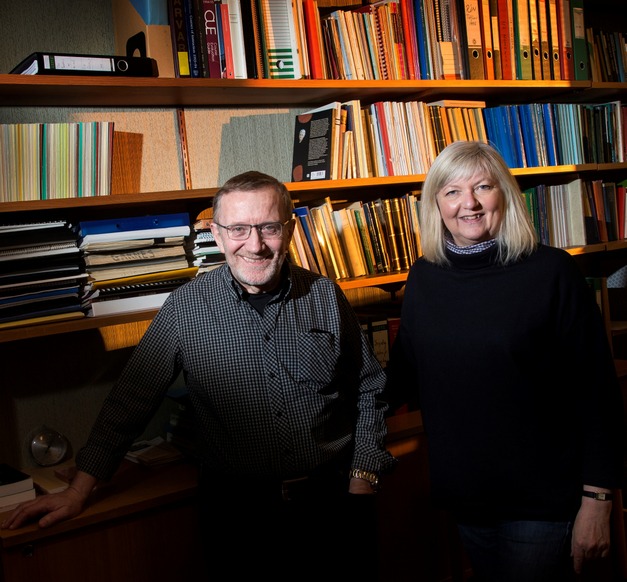Höskuldur Þráinsson, Professor Emeritus at the Faculty of Icelandic and Comparative Cultural Studies and Birna Arnbjörnsdóttir, Professor at the Faculty of Languages and Culture.
Academics and students at the Faculty of Icelandic and Comparative Cultural Studies and the Faculty of Languages and Culture have recently collaborated on a project to shed light on a variation of Icelandic, hitherto not much studied. This is the so-called Canadian Icelandic that is spoken by descendants of emigrants from Iceland to North-America.
"The study treats West Icelandic as an inherited language; a term that has been used about languages spoken in the home but that are a minority in the surrounding language community. In this context we will study the role of language in developing and maintaining the cultural self image of Icelandic Canadians," says Birna Arnbjörsdóttir, Professor in Second Language Acquisition, who leads the study with Höskuldur Þráinsson, Professor Emeritus in Icelandic grammar.
Höskuldur Þráinsson and Birna Arnbjörnsdóttir
"The study reached around 120 Canadian-Icelanders who spoke Icelandic to some extent. Even though some of them are fluent in Icelandic, they are few and no longer in their prime of life."

Extensive data on language, usage and the attitude of Canadian Icelanders towards Icelandic has been gathered. "We have conducted interviews with Canadian Icelanders and subjected them to various tests or surveys. We then submit comparable surveys to participants who speak "home Icelandic" to obtain a solid basis for comparison on the development of these two variations of Icelandic," says Höskuldur. "This increases the understanding of the part of grammatical factors on the one hand, and social and cultural on the other in language changes in general," adds Birna.
Students are among those who make use of, or have made use of, data from the study in their theses. According to Höskuldur the study has confirmed the suspicion that time is running out to gather new information on Canadian Icelandic. "The study reached around 120 Canadian-Icelanders who spoke Icelandic to some extent. Even though some of them are fluent in Icelandic, they are few and no longer in their prime of life. It is interesting for grammarians to see what is first to go and what stays the longest. Those results can be compared with comparable conclusions in our neighbouring countries, i.e. Denmark, Norway, and Sweden, where similar projects are being conducted," he adds.
Birna also points out that the project will increase understanding of the interaction between Icelandic and English in the New World, and the interaction of languages and cultures up close, both among individuals and speech communities. "This study will shed new light on the nature of language use and language changes in general, and on the nature of language acquisition in bi- or multilingual environments; from the point of view of reading, education and general adaptation. The knowledge will presumably be of use in helping immigrants in Iceland learn a new language and make their way in a new community," she concludes.


